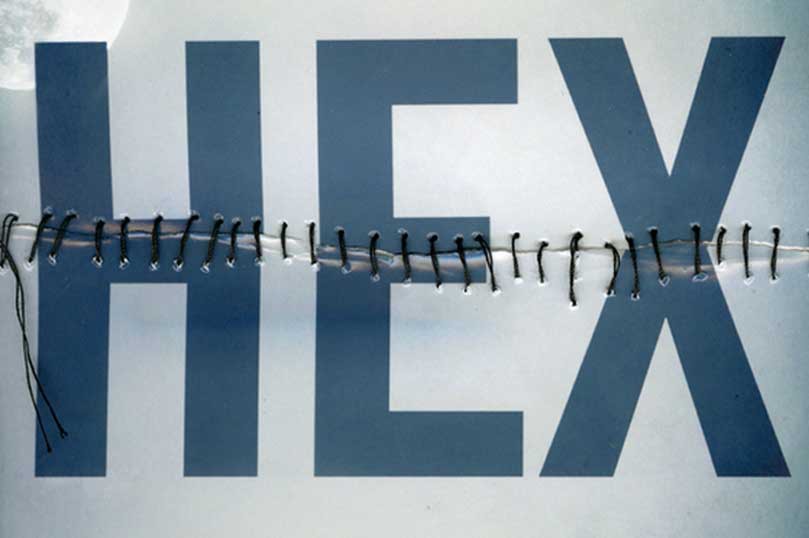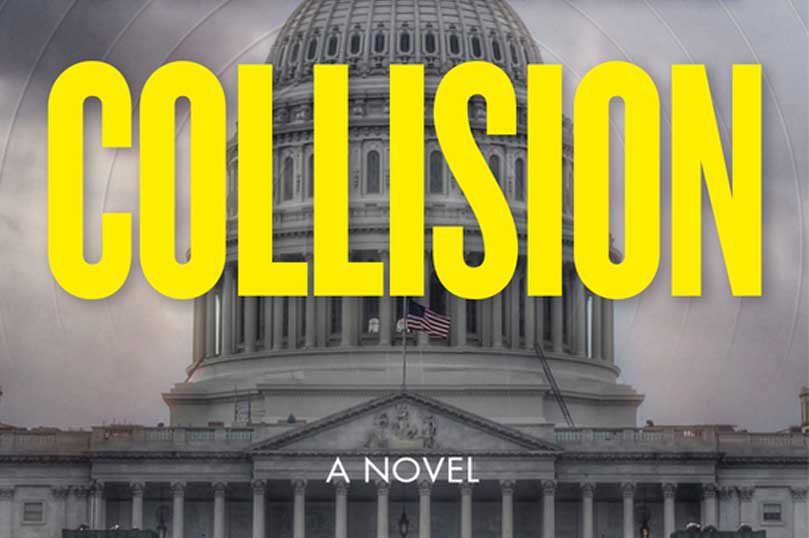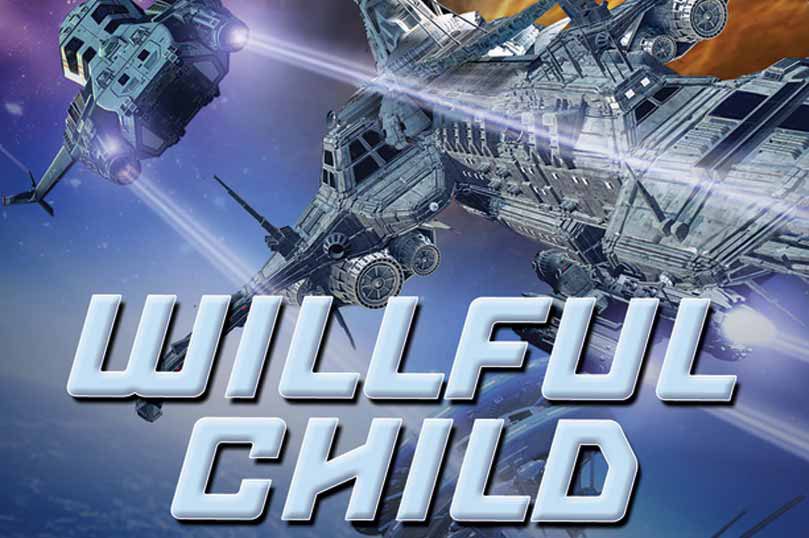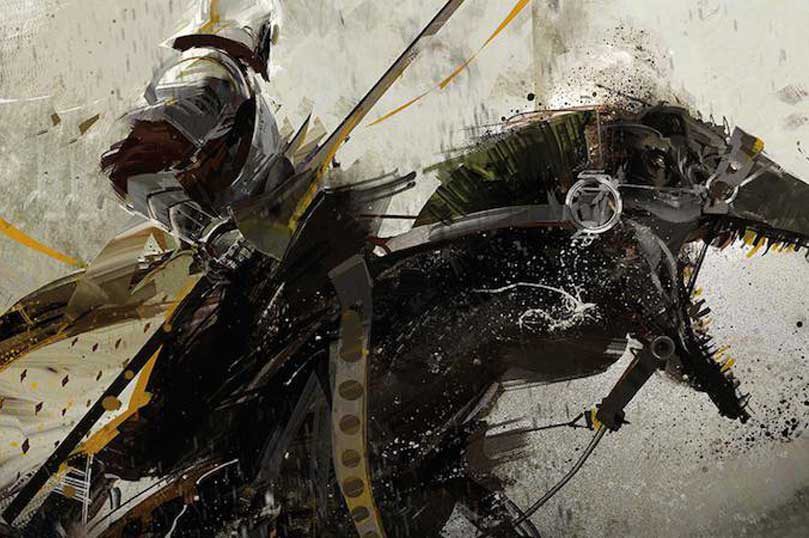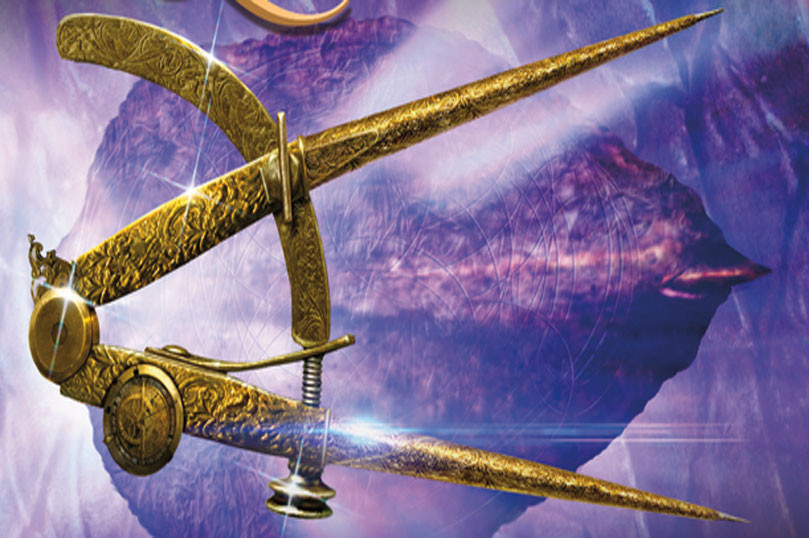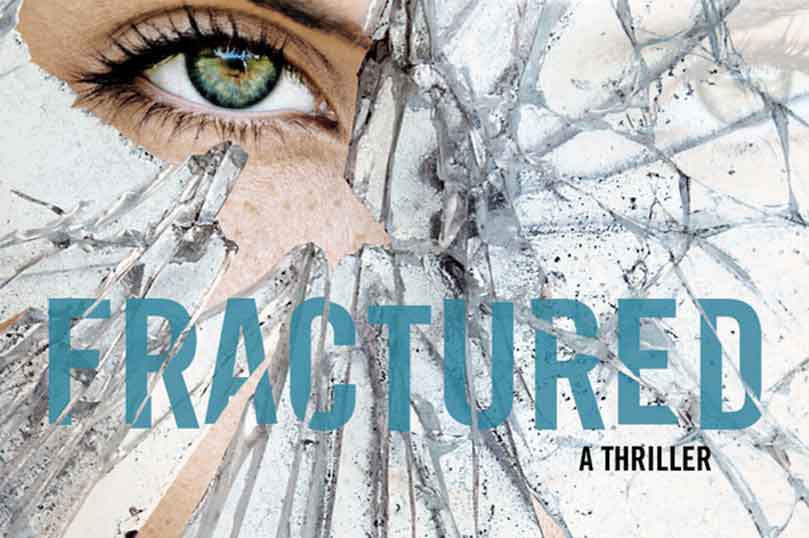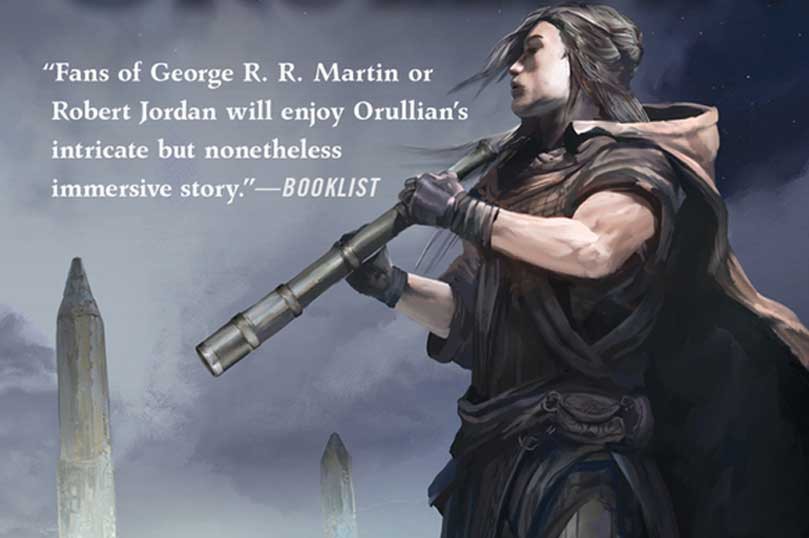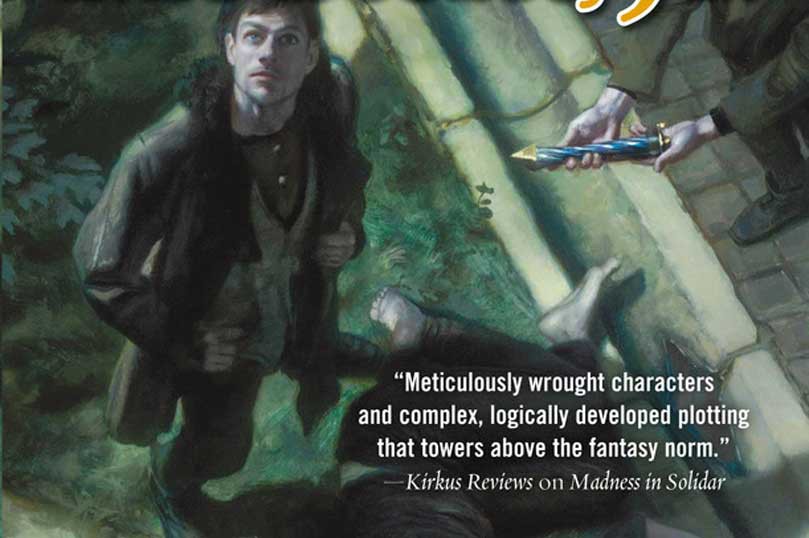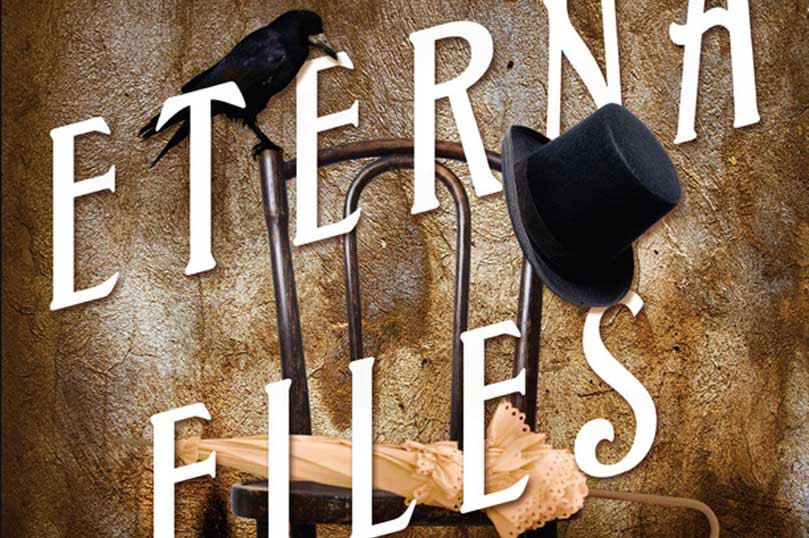opens in a new window opens in a new window
opens in a new window opens in a new window
opens in a new window opens in a new window
opens in a new window opens in a new window
opens in a new window opens in a new window
opens in a new window
opens in a new window A world made by the Eight Creators on which to play out their games of passion and power, Paradise is a sprawling, diverse, often brutal place. Men and women live on Paradise as do dogs, cats, ferrets, goats, and horses. But dinosaurs predominate: wildlife, monsters, beasts of burden–and of war. Colossal plant-eaters like Brachiosaurus; terrifying meat-eaters like Allosaurus, and the most feared of all, Tyrannosaurus rex. Giant lizards swim warm seas. Birds (some with teeth) share the sky with flying reptiles that range in size from bat-sized insectivores to majestic and deadly Dragons.
A world made by the Eight Creators on which to play out their games of passion and power, Paradise is a sprawling, diverse, often brutal place. Men and women live on Paradise as do dogs, cats, ferrets, goats, and horses. But dinosaurs predominate: wildlife, monsters, beasts of burden–and of war. Colossal plant-eaters like Brachiosaurus; terrifying meat-eaters like Allosaurus, and the most feared of all, Tyrannosaurus rex. Giant lizards swim warm seas. Birds (some with teeth) share the sky with flying reptiles that range in size from bat-sized insectivores to majestic and deadly Dragons.
Thus we are plunged into Victor Milán’s splendidly weird world of The Dinosaur Lords, a place that for all purposes mirrors 14th century Europe with its dynastic rivalries, religious wars, and byzantine politics…except the weapons of choice are dinosaurs. Where vast armies of dinosaur-mounted knights engage in battle. During the course of one of these epic battles, the enigmatic mercenary Dinosaur Lord Karyl Bogomirsky is defeated through betrayal and left for dead. He wakes, naked, wounded, partially amnesiac–and hunted. And embarks upon a journey that will shake his world.
opens in a new windowThe Dinosaur Lords will be out in paperback on May 31.Please enjoy this excerpt.
Chapter 1
Tricornio, Three-horn, Trike—Triceratops horridus. Largest of the widespread hornface (ceratopsian) family of herbivorous, four-legged dinosaurs with horns, bony neck-frills, and toothed beaks; 10 tonnes, 10 meters long, 3 meters at the shoulder. Non-native to Nuevaropa. Feared for the lethality of their long brow-horns as well as their belligerent eagerness to use them.
THE BOOK OF TRUE NAMES
THE EMPIRE OF NUEVAROPA, ALEMANIA, COUNTY AUGENFELSEN
They appeared across the river like a range of shadow mountains, resolving to terrible solidity through a gauze of early-morning mist and rain. Great horned heads swung side to side. Strapped to their backs behind shield-like neck-frills swayed wicker fighting-castles filled with archers.
“That tears it!” Rob Korrigan had to shout to be heard, though his companion stood at arm’s length on high ground behind the Hassling’s south bank. Battle raged east along the river for a full kilometer. “Voyvod Karyl’s brought his pet Triceratops to dance with our master the Count.”
Despite the chill rain that streamed down his face and tickled in his short beard, his heart soared. No dinosaur master could help being stirred by sight of these beasts, unique in the Empire of Nuevaropa: the fifty living fortresses of Karyl Bogomirskiy’s notorious White River Legion.
Even if they fought for the enemy.
“Impressive,” the Princes’ Party axeman who stood beside Rob yelled back. Like Rob he worked for the local Count Augenfelsen—“Eye Cliffs” in a decent tongue—who commanded the army’s right wing. “And so what? Our dinosaur knights will put paid to ’em quick enough.”
“Are you out of your tiny mind?” Rob said.
He knew his Alemán was beastly, worse even than his Spañol, the Empire’s common speech. As if he cared. He’d had this job but a handful of months, and suspected it wouldn’t last much longer.
“The Princes’ Party had the war all its own way until the Emperor hired in these Slavos and their trikes,” he said. “Three times the Princes have fought Karyl. Three times they’ve lost. Nobody’s defeated the White River Legion. Ever.”
The air was as thick with the screams of men and monsters, and a clangor like the biggest smithy on the world called Paradise, as it was with rain and the stench of spilled blood and bowels. Rob’s own guts still roiled and his nape prickled from the side effects of a distant terremoto: the war-hadrosaurs’ terrible, inaudible battle cry, pitched too low for the human ear to hear, but potentially as damaging as a body blow from a battering ram.
An Alemán Elector, one of eleven who voted to confirm each new Emperor on the Fangèd Throne, had inconsiderately died without issue or named heir. Against precedent the current Emperor, Felipe, had named a close relative as new Elector, which gave the Fangèd Throne and the Imperial family, the Delgao, unprecedented power. The Princes’ Party, a stew of Aleman magnates with a few Francés ones thrown in for spice, took up arms in opposition.
The upshot of this little squabble was war, currently raging on both banks and hip-deep in a river turning slowly from runoff-brown to red. As usual, masses of infantry strove and swore in the center, while knights riding dinosaurs and armored horses fought on either side. Missile troops and sundry engines were strung along the front, exchanging distant grief.
Rob Korrigan worked for the Princes’ side. That was as much as he knew about the matter, and more than he cared.
“You forget,” the house-soldier shouted. “We outnumber the Impies.”
“Gone are the days, my friend, when all King Johann could throw at us was a gaggle of bickering grandes and a mob of unhappy serfs,” Rob said. “The Empire’s best have come to the party now, not just Karyl’s money-troopers.”
The axeman sneered through his moustache. “Pike-pushers are pike-pushers, no matter how you tart ’em up in browned-iron hats and shirts. Or are you talking about that pack of spoiled pretty boys across the river from us, and their Captain-General, the Emperor’s pet nephew?”
“The Companions are legend,” Rob said. “All Nuevaropa sings of their exploits. And most of all, of their Count Jaume!”
As I should know, he thought, since I’ve made up as many ballads of the Conde dels Flors’ deeds as Karyl’s.
The Augenfelsener ran a thumb inside the springer-leather strap of his helmet where it chafed his chin. “I hear tell they spend their camp time doing art, music, and each other.”
“True enough,” Rob said. “But immaterial.”
“Anyway, there’s just a dozen or two of them, dinosaur knights or not.”
“That’s leaving aside the small matter of five hundred heavy-horse gendarmes who back them up.”
The house-shield waved that away with a scarred and crack-nailed hand.
Standing in formation across the river, the three-horns sent up a peevish, nervous squalling. A rain squall opened to reveal what now stalked out in front of their ranks: terror, long and lean, body held level, whiplike tail swaying to the strides of powerful hind legs. In Rob’s home isles of Anglaterra they called the monster “slayer;” in Spañol, “matador,” which meant the same. In The Book of True Names, they were Allosaurus fragilis. By whatever name, they were terrifying meat-eaters, and delighted in preying on men.
A man rode a saddle strapped to the predator’s shoulders, two and a half meters up. He looked barely larger than a child, and not just in contrast to his mount’s sinuous dark brown and yellow-striped length. For armor he wore only an open-faced morion helmet, a dinosaur-leather jerkin, and thigh-high boots.
Thrusting its head forward, his matador—matadora—roared a challenge at the dinosaur knights and men-at-arms waiting on the southern bank: “Shiraa!”
The axeman cringed and made a sign holy to the Queen Creator. “Mother Maia preserve us!”
Rob mirrored the other’s gesture. Maia wasn’t his patroness. But a man could never be too sure.
“Never doubt the true threat’s not the monster, but the man,” he said. He scratched the back of his own head, where drizzle had inevitably filtered beneath the brim of his slouch hat and begun to trickle down his neck. “Though Shiraa’s no trifle either.”
“Shiraa?”
“The Allosaurus. His mount. It’s her name. Karyl gave it to her when she hatched and saw him first of living creatures in the world, and him a beardless stripling not even twenty and lying broken against the tree where her mother’s tail had knocked him in her dying agony. It’s the only thing she says, still.”
No potential prey could remain indifferent to the nearness of such a monster. That was why even the mighty three-horns muttered nervously, and they were used to her. But the house-shield did rally enough to turn Rob a look of disbelief.
“You know that abomination’s name?” he demanded. “How do you know these things?”
“I’m a dinosaur master,” Rob said smugly. Part of that was false front, to cover instinctive dread of a creature that could bite even his beer-keg body in half with a snap, and part excitement at seeing the fabled creature in the flesh. And not just because meat-eating dinosaurs used as war-mounts were as rare as honest priests. “It’s my business to know. Don’t you? Don’t you ever go to taverns, man? ‘The Ballad of Karyl and Shiraa’ is beloved the length and breadth of Nuevaropa. Not to mention that I wrote it.”
The axeman tossed Shiraa a nervous glance, then glared back at Rob. “Whose side are you on, anyway?”
“Why, money’s,” answered Rob. “The same as you. And Count Eye Cliffs, who pays the both of us.”
The axeman grabbed the short sleeve of the linen blouse Rob wore beneath his jerkin of nosehorn-back hide. Rob scowled at the familiarity and made ready to bat the offending hand away. Then he saw the soldier was goggling and pointing across the river.
“They’re coming!”
Shiraa’s eponymous scream had signaled the advance. The trikes waded into the river like a slow-motion avalanche with horns. Before them sloshed the matadora and Karyl.
From the river’s edge to Rob’s right came a multiple twang and thump. A company of Brabantés crossbowmen, the brave orange and blue of their brigandine armor turned sad and drab by rain, had loosed a volley of quarrels.
Rob shook his head and clucked as the bolts kicked up small spouts a hundred meters short of the White River dinosaurs.
“It’s going to be a long day,” he said. “The kind of day that Mother warned me I’d see Maris’s own plenty of.”
The axeman shook himself. Water flew from his steel cap and leather aventail.
“It doesn’t matter,” he said, all bravado. “Even riding those horned freaks, those Slavo peasant scum can’t withstand real knights. Young Duke Falk’s already chased the Impy knights back up the north bank on our left flank. Soon enough our rabble will overrun their pikes. And there’s our victory, clean across.”
Glaring outrage that the man should forget that both of them were peasant scum, Rob said, “You think shit-foot serf conscripts can defeat the Brown Nodosaurs? Even at a three to one advantage? Man, you’re crazier than if you imagine our fat Count’s duckbills can beat Karyl’s trikes.”
“He never faced us before.”
“You really think that matters, then?”
“Five pesos say I do.”
I thought you’d never say that, Rob thought, smirking into his beard.
Downriver to their right, trumpets squealed, summoning the Count’s dinosaur knights to mount. Which meant they summoned Rob.
He held faint hope his scheme, which to himself he admitted was daft enough on the face of it, would win his employer’s last-minute approval. But of faint hopes was such a life as Rob Korrigan’s made.
A cloud of arrows rose from the three-horns’ fighting-castles, moaning like souls trapped by wiles of the Fae. Voyvod Karyl, that many-faceted madman, had famously commissioned artisans in his Misty March to discover treatments to keep bowstrings taut in rain such as this, and to prevent the wicked-powerful hornbows from the arid Ovdan uplands from splitting and becoming useless.
“Shit!” Rob yelled. He was almost out of time.
A-boil with conflicting emotions, he turned and ran as best a run as his bandy legs could muster. He clung to the haft of Wanda, the bearded axe slung across his back, to keep her from banging into his kidneys.
“You’re on!” he shouted back at the house-shield. “And make it ten, by Maris!”
Arrows stormed down on the mercenary crossbowmen on the Hassling’s southern bank. Men shrieked as steel chisel points pinned soft iron caps to their heads and pierced their coats of cloth and metal plates. Rob saw the sad little splashes the return volley made, still fifty meters shy of the trikes. Recurved White River bows sorely outranged the Princes’ arbalests.
The three-horns’ inexorable approach had unnerved the Brabanters. Shiraa’s roar knotted their nutsacks, if the state of Rob’s own was any guide. Getting shot to shit now, with no chance on Paradise of hitting back, was simply more than flesh could stand.
Throwing away their slow-to-reload weapons, the front ranks whipped ’round and bolted—right into the faces of their comrades behind. Who pushed back.
The four stingers the Count had emplaced in pairs to the mercenaries’ either side might have helped them. The light, wheeled ballistas outranged even barbarian hornbows. Their iron bolts could drop even a ten-tonne Triceratops.
But the engines lay broken and impotent in the shallows with their horsehair cords cut. An Eye Cliffs under-groom who’d watched it all had told Rob how a palmful of Companions had emerged from the river Maia-naked in the gloom before dawn. As he yelled his lungs out to raise the alarm the camp, the knight-monks daggered the engineers and the sentries guarding the stingers as they tried to struggle out of sleep. Then with the axes strapped to their bare backs, they’d had their way with the stingers and dragged the wrecks out into the Hassling with the artillerymen’s own nosehorn teams. Before the dozing Augenfelseners could respond, they dove back in the water, laughing like schoolboys, and swam home, having lost not a man.
The under-groom, who for reward had gotten a clout across the chops for not raising the alarm earlier and louder, had seemed equal parts disgusted and amused by the whole fiasco. To Rob, it was a classic piece of Companion derring-do. In the back of his mind he was already composing a song.
But now he was in among the war-mounts—Rob’s own charges—and needed all his wits about him. He dodged sideways to avoid the sweep of a tall green and white tail, vaulted a still-steaming turd the size of his head, sprinted briefly with a little pirouette at the end to avoid being knocked sprawling by the breastbone of a yellow-streaked purple duckbill that lurched forward as it thrust itself up off its belly.
The last he suspected was no accident. Invaluable as their skilled services were, dinosaur masters were commoners. Nobles who employed them, as the Count did Rob, generally suffered them as necessary evils. Their knights didn’t always appreciate them as more than uppity serfs who wanted knocking down.
Or squashing beneath the feet of a two-and-a-half-tonne monster.
But Rob was born sly. His mother had sold him as a mere tad of fifteen to a one-legged Scocés dinosaur master. If he hadn’t made that up; at this remove he had trouble remembering. He’d been forced to come up wise in the ways of war-duckbills. And their owners.
Men shouted. Hadrosaurs belled or piped, each at ear-crushing volume. Down by the river, the Princes’ luckless arbalesters screamed as White River arrows butchered them.
Uncrushed, Rob reached the high ground where the Count had pitched his pavilion. When the Augenfelsen contingent arrived at yesterday’s dusk, this whole stretch of riverbank was all green grass as tall as Rob’s head. Their monsters had chomped it low and trampled the remnants into the yellow mud.
Rob’s head swam from unfamiliar exertion and the concentrated reek of dinosaur piss and farts. That was familiar, surely, but he wasn’t accustomed to forcibly pumping his head full of it like this.
Hapless arming-squires grunted to boost the Count of the Eye Cliffs’ steel-cased bulk into the saddle. Though the cerulean-dappled scarlet duckbill bull squatted in the muck, it was a nearly two-meter climb.
The Count rode a long sackbut—or Parasaurolophus, as The Book of True Names had it. Like most hadrosaurs, it usually walked on its huge hind legs, and dropped to all fours to gallop. It had a great triangle of a head, with a broad, toothed beak and a backward-arcing tubular crest. The crest gave its voice a range and striking tones like the slide-operated brass musical instrument called a sackbut, thus the name.
With a great groan of effort, the Count flung his leg over. Middle-aged at eighty, his lordship tended to spend far more time straddling a banquet stool than a war-mount. It showed in the way his chins overflowed onto his breast-and-back without apparent intervention of a neck. Unlike their lesser brethren who rode warhorses, dinosaur knights didn’t need to keep themselves in trim. Their real weapon was their mount.
Snorting from both ends, the sackbut heaved himself to his feet. A rain-soaked cloth caparison clung to his sides, molding the pebbly scales beneath. Rob counted it a blessing that clouds and downpour muted both the dinosaur’s hide and the Count’s armor, enameled all over in swirls of blue and gold and green—a pattern that the Anglysh, usually without affection, called “paisley.” Unlike most dinosaur knights, the Count had neither picked nor bred his mount to sport his heraldic colors. They clashed something dreadful.
Rob sucked in a deep breath through his mouth. As dinosaur master it was his job to keep his lord’s monsters fit, trained, and ready for war. But it was also his duty to advise his employer on how best to use his eye-poppingly expensive dinosaurs in battle. Duty to his craft now summoned Rob to do just that, and he wasn’t happy about it.
He’d have been tending the Count’s sackbut this very instant had his employer not curtly ordered Rob and his lowborn dinosaur grooms to clear out and leave final preparations to the squires. In their wisdom, the Creators had seen fit to endow the nobles who ruled Nuevaropa with courage and strength instead of wit. Or even sense.
“My lord!” Rob shouted. He clutched at a stirrup. Then he danced back with a nimbleness that belied his thick body and short legs as the Count slashed at his face with a riding crop.
“Shit-eating peasant! You dare manhandle me?”
“Please, Graf!” Rob shouted, ignoring what he deemed an unproductive question whose answer his employer wouldn’t like anyway. “Let me try my plan while there’s still time.”
“Plan? To rob me and my knights of glory, you mean? I spit on your dishonorable schemes!” And he did. The gob caught Rob full on the cheek. “My knights will scatter these brutes like the overgrown fatties they are.”
“But your splendid dinosaurs, lord!” Rob cried, hopping from foot to foot in agitation. “They’ll impale themselves on those monsters’ horns!”
Slamming shut the visor of his fatty-snout bascinet—which Rob found oddly appropriate—the Count waved a steel gauntlet at his herald, who blew advance on his trumpet. Rob winced. The herald couldn’t hit his notes any better than the Count’s mercenary crossbowmen could hit the White River archers.
Rob sprang back to avoid getting stepped on as the Count spurred his sackbut forward. His knights sent their beasts lurching at a two-legged trot down the gentle slope to the water.
“You’ll just disorder your knights when you ride down your own crossbows, you stupid son of a bitch!” Rob shouted after his employer. Whom he was sure couldn’t actually hear him. Fairly.
We don’t just call them ‘bucketheads,’ he thought, wiping spit and snot from his face, because they go into battle wearing pails.
Despite the urgency drumming his ribs from inside, Rob could only stand and watch the drama play out. Even rain-draggled, the feather crests, banners, and lurid caparisons of fifty dinosaur knights made a brave and gorgeous display.
The mercenary arbalesters had stopped shooting. To Rob their only sensible course now was to run away at speed. He knew, as dinosaur master and minstrel both, how little pay means to those too dead to spend it.
Instead, insanely, the rear ranks now battled outright with their fleeing fellows. The Brabanters were among the Empire’s ethnic odds and sods, swept together into a single Torre Menor, or Lesser Tower, that claimed to serve all their interests. Even at that it was inferior to the other Towers: the great families that ruled Nuevaropa and its five component Kingdoms. The Brabanters made up for insignificance with lapdog pugnacity. Which won them a name as right pricks.
The White River archers had stopped loosing too. Their monsters now stood just out of crossbow range. Evidently Karyl was content to observe events.
These happened quickly. At last the Brabanters got their minds right. They quit fighting each other and, as one, turned tail. To see bearing down on them the whole enormous weight of their own employers’ right wing.
As hadrosaurs squashed the mercenaries into screams and squelches and puffs of condensation, the Legion’s walking forts waded forward again. From their howdahs the hornbowmen and women released a fresh smoke of arrows.
With a pulsing bass hum, the volley struck the Count’s dinosaur knights. Arrows bounced off knightly plate. But duckbills screamed as missiles stung thick hides. Rob guessed the archers had switched to iron broadhead arrows.
Already slowed by riding down the crossbowmen, the dinosaur knights lost all momentum in a chaos of thrashing tails and rearing bodies. Wounded monsters bugled and fluted, drowning the shrieks of riders pitched from saddles and smashed underfoot.
Rob held up his right fist to salute the Count, a single digit upraised. It was, he told himself, an ancient sign, and holy to his patron goddess, Maris, after all.
Then he turned and scuttled east. His employer was a spent quarrel. Now he’d carry out his plan himself.
Copyright © 2015 by Victor Milán
Buy The Dinosaur Lords from:
opens in a new window opens in a new window
opens in a new window opens in a new window
opens in a new window opens in a new window
opens in a new window opens in a new window
opens in a new window opens in a new window
opens in a new window
 opens in a new window
opens in a new window opens in a new window
opens in a new window opens in a new window
opens in a new window opens in a new window
opens in a new window opens in a new window
opens in a new window
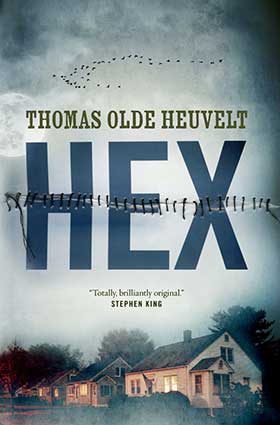 The trade paperback edition of opens in a new windowHEX, by Thomas Olde Heuvelt, will be published April 4th! In honor of the book that Stephen King called “totally, brilliantly original,” we wanted to share this Paperback Spotlight.
The trade paperback edition of opens in a new windowHEX, by Thomas Olde Heuvelt, will be published April 4th! In honor of the book that Stephen King called “totally, brilliantly original,” we wanted to share this Paperback Spotlight. 
